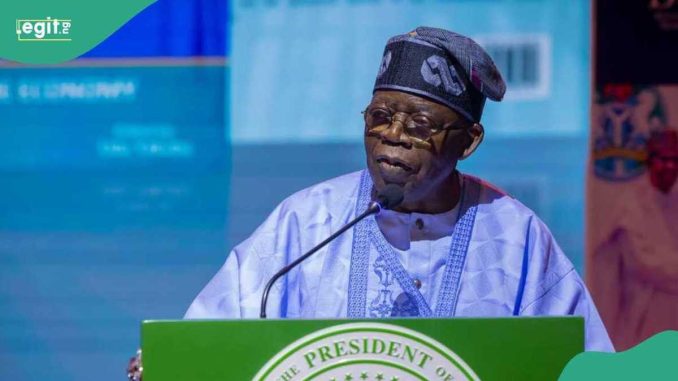
Dr. Awe Emmanuel O. highlighted that President Tinubu’s economic reforms, including fuel subsidy removal and exchange rate unification, have increased government revenue
He noted that Nigeria’s transition from austerity to prosperity requires economic diversification, infrastructure improvements, and effective monetary policies
Despite challenges such as inflation and political instability, he believes consistent policies and investment in human capital will drive long-term economic growth
Dr. Awe Emmanuel O., a renowned economic expert, has expressed optimism regarding the economic reforms implemented by President Bola Tinubu’s administration.
He shared his insights during a one-day intellectual discourse organized by the Beyond Boundaries Legacy Leadership Initiative (BBLLI) in collaboration with the Civic Centre on Economic Reforms, Policies, and Planning.
The event, themed “Between Austerity and Prosperity: Nigeria Yesterday, Today and Tomorrow,” sought to assess the state of Nigeria’s economy and the impact of Tinubu’s Renewed Hope Agenda.
Dr. Awe acknowledged that while the reforms have introduced economic challenges, they remain crucial steps toward sustainable growth.
Subsidy removal boosted gov’t revenue – expert
According to Dr. Awe, the removal of fuel subsidies and the unification of exchange rates have boosted government revenue. However, these measures have also resulted in financial strain for many Nigerians.
He maintained that such policies, despite their short-term hardships, are necessary for long-term economic stability and prosperity.
Highlighting Nigeria’s economic history, Dr. Awe noted the recurring cycles of austerity and prosperity. He stressed that for the nation to achieve sustained economic progress, it must prioritize diversification by strengthening key sectors such as manufacturing and technology while also improving infrastructure.
He further stated that effective monetary and fiscal policies are essential in controlling inflation and stabilizing the exchange rate.
Dr. Awe also underscored the importance of transparency and public engagement in economic policy-making.
“While challenges persist, including high inflation and exchange rate volatility, President Tinubu’s economic reforms offer a promising path forward,” he said.
He noted that with consistency, transparency, and national unity, Nigeria could transition from economic instability to long-term prosperity, fostering inclusive growth and development.
Economist forecast direction of Nigeria’s future
Looking ahead, Dr. Awe stressed that Nigeria’s economic future remains promising, provided the country focuses on key growth drivers.
“The focus on economic diversification, particularly in agriculture, manufacturing, and the services sector, has potential,” he remarked.
He acknowledged that the government has taken steps to improve the ease of doing business, citing initiatives such as the Nigeria Economic Sustainability Plan (NESP), which aims to promote local manufacturing and stimulate the private sector.
CAN makes crucial demand from Tinubu
Earlier, Legit.ng reported that the Christian Association of Nigeria (CAN) in the 19 northern states and the Federal Capital Territory (FCT) had acknowledged that President Bola Ahmed Tinubu’s administration has demonstrated inclusiveness despite the Muslim-Muslim presidency.
However, the body reiterated its call for greater representation of Christians in key political positions to reflect Nigeria’s religious diversity.



